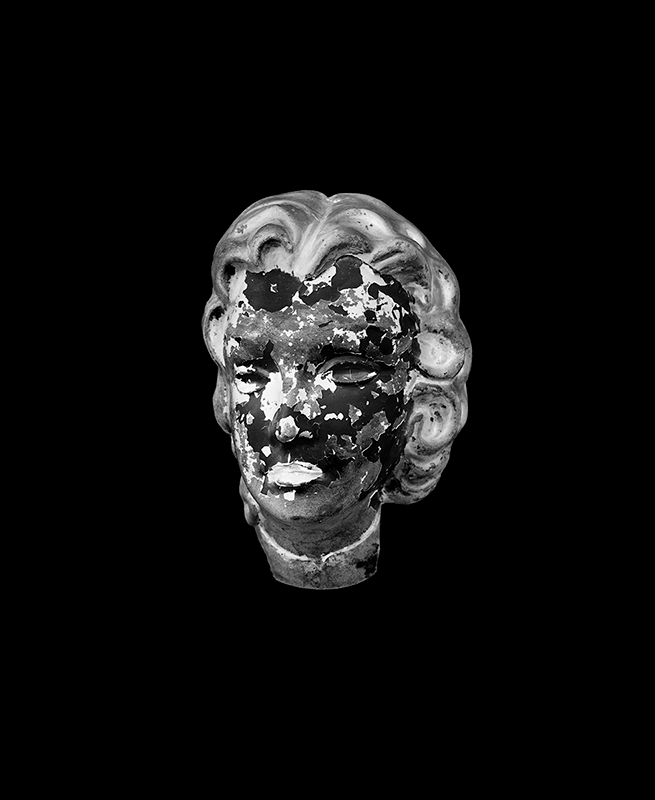
Cuchifritos Gallery + Project Space is pleased to present Backward ran sentences until reeled the mind, a solo show of recent work by Elizabeth Moran.
Since June 2017, Moran has researched the history of fact-checking as a profession. The position was created by TIME Magazine’s founders in 1923, and as the first weekly news magazine in the US, TIME served as an aggregator, culling stories from 300 newspapers. TIME’s reporting was advertised as “written after the most thorough and exhaustive scrutiny of news-sources;” however, this “exhaustive scrutiny” was considered women’s work from its inception. Indeed, early fact-checking manuals include instructions to confirm names, dates, etc., while the checkers maintain their “domestic list of chores.” Darning socks and facts. Ironing shirts and statements.
According to the artist’s ongoing research, each advertisement from the publication’s first year in existence often relied on absurd metaphors—like “Catch 100 baseballs with a seven-bushel crab net”—and the use of male pronouns—like “He cut the Gordian Knot”—to describe the work done by the women fact-checkers. Using these advertisements as a point of departure, Moran composes tableaus with found objects and office materials from the 1920s, including a typesetter’s drawer, letter opener, and telephone receiver. With a surrealist approach (The Surrealist Manifesto was published just one year following the launch of TIME magazine), Moran ultimately documents the efforts of an invisible class by creating a series of potentially confusing images that visualize TIME’s absurd language describing the women’s labor.
Moran’s latest series interrogates the historical association between women’s work and fact-checking, particularly within today’s “post-fact” information landscape. Drawing from the earliest advertisements for TIME magazine, Moran’s photographs and sculptures give rare voice to these once-anonymous women.
In parallel, Moran has been experimenting with carbonless paper both as a material and as a proxy for the simultaneous presence and absence of these women and their work. Indeed, fact-checkers used carbonless paper when typing-up manuscripts, so the copies (the “pinks” and “yellows”) could be distributed to TIME’s staff. The material responds to pressure, similarly to how photographic paper responds to light, resulting in ghostly imprints of information or touch.
Part four of the 4-part Workspace ’18 exhibition series, featuring new work by residents of AAI’s LES Studio Program
Elizabeth Moran (b. 1984, Houston) received her MFA from California College of the Arts and BFA from New York University’s Tisch School of the Arts. Moran’s research-based practice is directed by a preoccupation with evidence of unknown or little-understood histories and often takes form through photography, audio, text, and found objects. Most recently, Moran’s work was included in “From Generation to Generation: Inherited Memory and Contemporary Art” at The Contemporary Jewish Museum. Recent solo exhibitions include “Measuring Visual Disturbances” at Black Crown Gallery and group exhibitions at the Headlands Center for the Arts and the Wattis Institute from Contemporary Arts. Moran was awarded a Murphy and Cadogan Fellowship in 2012 and a Tierney Fellowship in 2013. She was named a 2013 winner of Magenta Foundation’s Flash Forward (US) and was included in Photoboite’s 30 Under 30 Women in Photography and the CENTER Santa Fe 100 in 2014. In 2015, she was an artist-in-residence at the Rayko Photo Center in San Francisco. Moran’s work has been featured in Yield, Harper’s, The New Yorker, WIRED, The New York Times, New York Magazine, British Journal of Photography, and Hotshoe.
Cuchifritos is FREE to the public and handicap accessible. Located inside Essex Street Market at the south end nearest Delancey.
Cuchifritos Gallery + Project Space is a program of Artists Alliance Inc., a 501c3 not for profit organization located on the Lower East Side of New York City within the Clemente Soto Vélez Cultural and Educational Center. Cuchifritos is supported in part by the New York City Department of Cultural Affairs in partnership with the City Council. This program is made possible by public funds from the New York State Council on the Arts and the National Endowment for the Arts. We thank the following for their generous support: Foundation for Contemporary Arts, New York City Economic Development Corporation and individual supporters of Artists Alliance Inc. Special thanks go to our team of dedicated volunteers, without whom this program would not be possible.











